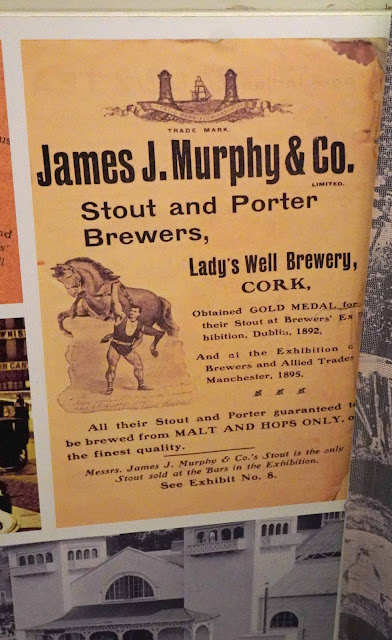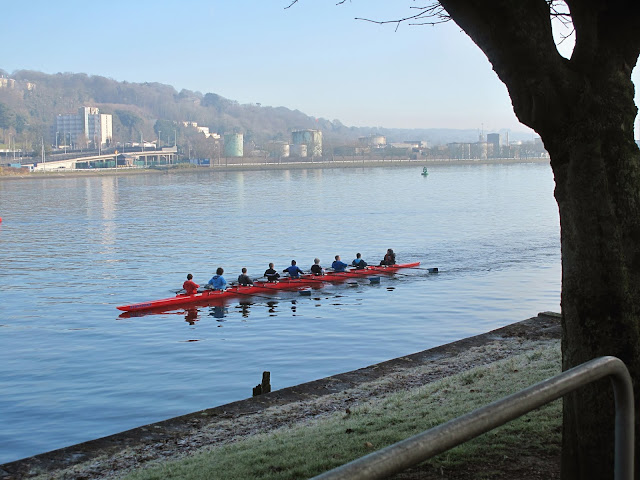Food and drink at Cork Public Museum and a snack at the Natural Foods Bakery Café, all under one roof.
 |
| Fr Matthew's 19th-century teapot in the public museum. My cuppa at the café came in a cardboard cup (21st-century). |
A few years back, I watched as renowned baker Declan Ryan (Arbutus) produced an Iron Age Bread, all part of the 2016 Cork Heritage Day.
The venue was the Cork Public Museum in Fitzgerald's Park. I have been there in the meantime but last week's trip had a specific aim in mind and that was to check on what Cork people were eating and drinking over the previous century and more.
 |
| 'Republican Silver' Rose Bowl made by W. Egan and Sons in 1922 |
Not in any great detail, mind you. There is no specific display on this theme but there is quite a lot of info scattered around the rooms of the museum where industrial innovators (Johnson & Perrot and Morrough Mills) and sporting heroes (Sonia and Roy and Christy) are also remembered, among many others.
Like everything else, food and drink had good times and bad, sometimes simultaneously. There is an admission ticket for the Lee Regatta in August 1846, right in the middle of the Great Famine. Move up a hundred years or more and see a couple of ration books from 1944 (during WW2) and 1948 (3 years afterwards).
But no danger of rations for some at the International Exhibitions held on this very site in the early years of the 20th century. Their Majesties were treated to a luncheon in 1903. The really posh venue of that year's exhibition was the Western Pavilion, which housed the Canadian exhibition in 1902. It was promoted the following year and was used for "Variety Entertainments of a superior and refined type", and the big invite was to the Royal Dinner. The menu was, of course, in French.
 |
| Luncheon menu |
I didn't see any wine listed for the royal feasts. Just wonder if any of the local drinks were offered. The museum has quite a few posters and outdoor signs from our brewers, distillers and merchants, such as Murphy's Stout, W Cashman and Co. (Teas, Wines, Spirits), and Cork Distillers.
 |
| Regatta went ahead during the famine. Is is true that the English Market was also open in those years? |
If you found yourself with the hoi polloi at the old Opera House, then you were in the capable hands of John Daly & Company, caterers to all the bars in the building. In 1938, they were "pushing" Tanora and Grape Fruit Crush in the margins of the programme for The Island (a play in three acts).
 |
| Opera House 1938. Anyone for Tanora? |
While those two drinks seem innocent enough, the stronger ones had (have) a downside and Fr Matthew was on a crusade against the abuse. Just wonder if he took his sturdy teapot with him on his various trips. In any event, it survives and is on display here.
 |
| Help (bags of grain) for famine victims from Canada's New Brunswick. |
If you had a drink at home, then you just had to have a proper decanter at hand and the local Cork glassmakers were well up to the task and there are some excellent ones on display here.
Cork silversmiths and goldsmiths were very strong in the 17th and 18th centuries and there is a collection here of their fine work. I put my eye on two in particular, the sugar bowl made by John Nicholson (died 1824) and his son Nicholas, both of whom worked at 70 Grand Parade, Cork and, of much more recent vintage, the 'Republican Silver' Rose Bowl made by W. Egan and Sons in 1922.
 |
| The Natural Foods Bakery where I enjoyed a snack. It is part of the museum building but has its own exit/entrance |
Must get back to the museum shortly as we barely covered half of it on the day. After all that reading on food and drink, it was time to call the Natural Foods Bakery Café in the building and here we enjoyed a cup of excellent tea and a pair of tasty pastries before heading off to catch the bus. The tea by the way was in a cardboard cup - I don't think that would go down well in the Western Pavilion in 1903!
 |
| Strong stuff! |















































